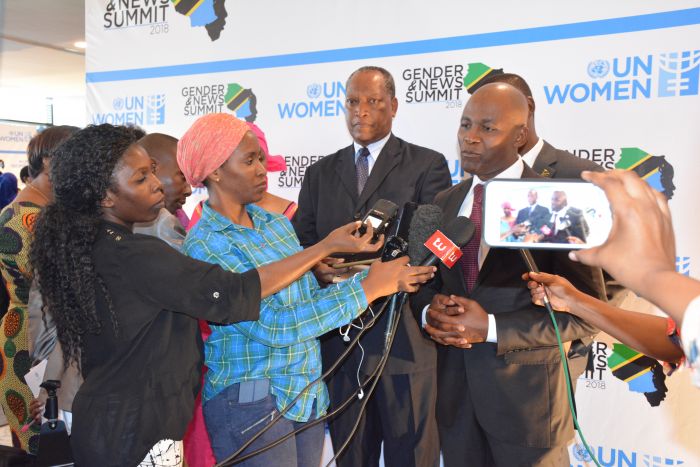Journalists are essential players in the fight for gender equality and the implementation of Agenda 2030. This was made clear after the Gender and News Summit held in Dar es Salaam, Tanzania, at the end of August.
Half of the world's population is made up of women, but women are only seen in just under a quarter of the global news flow. In Sweden, there are two men for every woman in the news, shows the global news study Global Media Monitoring Project (GMMP) from 2015. In Tanzania, the proportion of women is estimated at 22 percent and in addition, Tanzanian women are almost completely excluded in media areas such as sports, science and economics. .
Zuhura Selemani, a professor of journalism at the University of Dar es Salaam, explains in an interview with Who Makes the News (WMTN) that several Tanzanian newspapers, both state and private, live on sensationalism and tend to be very sexist. Not least, this became apparent last summer when the regime passed a law banning girls who become pregnant during their schooling from returning to school after giving birth.
- Some news reporters mocked female students, with little or no regard for the fact that many of the girls have been sexually exploited and therefore become pregnant, Selemani explains.
With this in mind, the organization Gender Links together with the UN in Tanzania - and with support from, among others, the Swedish Embassy - organized the conference Gender and News Summit 2018 and Dar es Salaam. The purpose was to highlight gender-conscious news reports linked to the UN's global goals for sustainable development. Particular attention was paid to Objective 5 on achieving gender equality, and the empowerment of all women and girls, but also other development agendas such as Africa's Agenda 2063 and the Beijing Platform were in focus.
- We want to encourage journalists to create a new media landscape with a stronger gender perspective in Tanzania, said Colleen Lowe Morna, head of Gender Links, in her closing speech.
During the conference, journalists in the print media, television and radio were praised who, through their commitment, questioned stereotypes and promoted the portrayal of women in the media in Tanzania. The participants competed with reports published between 1 July 2017 and 6 August 2018, all based on a number of criteria for gender-conscious news reporting. A total of 115 participants competed, of which 45 went to the final where nine prizes were awarded.
The acclaimed Tanzanian journalist and one of the judges during the conference, Rose Haji Mwalimu, was very pleased with all the contributions:
- The contributions were of extremely high quality and I was pleased that every aspect of sustainability goal number 5 was covered.
One of the winners of the Gender & News Summit 2018 is called Hilda Phoya and has with her reporting shown examples of how a more equal news reporting should go. Hilda Phoya's report was a documentary about the role of women in agriculture, about equal rights to financial resources and the possibility of owning land. The award will go to further reports for a fairer and more inclusive Tanzania.
Despite the current situation, Tanzania is the country in East Africa that has the most equal news reporting and the trend in the region is positive. UN Womens chef Dr. Phumzile Mlambo-Ngucka has long criticized the country's media, but is now hoping for more success stories that identify more female Tanzanian heroes:
- We want the Tanzanian media to show the way for equal news reporting, concludes Phumzile Mlambo-Ngucka and thanks everyone involved for a successful conference.


